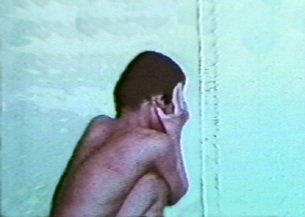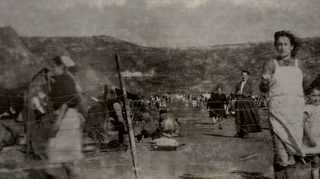Human Warehouses, Prison Camps, Artists’ Colonials, and SCHREI 27
August 25, 2012
by Diamanda Galás, London, August 3, 2012
Delivered at the PURCELL ROOM, THE SOUTHBANK CENTRE, after the showing of SCHREI 27
Spanish translation
Slovakian translation
I was commissioned in 1994 by the American New Radio series to compose a piece about bedlam. American New Radio is located in Staten Island, close to the WiIlowbrook Asylum, albeit it was called the Willowbrook School. It was closed down after an exposé by THE STATE ISLAND which substantiated the cry of “snake pit” by Robert Kennedy; and afterwards was the subject of several exposés on national television by Geraldo Rivera. The institution had been official opened in 1930 and was not closed down until 1987. In the 50’s and earlier, doctors generally recommended that the mentally-infirm (choose your definition) be sent to institutions that would “help” them get adjusted to the real world.
Their real world consisted of eating off of floors covered with feces, sleeping naked in restrooms, being raped by staff workers, and being injected with Hep C, since they were discarded humans available for research. Family visits would range, after the first four months of mandatory separation, from every week to every five years.
(Please click here for videoclip.)
The entire population had Hepatitis A, contracted within one week after each member arrived. The videos I have seen of this place resemble those of Leros, an Eastern island of Greece, that used to be a prison camp. Leros employed former camp guards and completely untrained, albeit well-meaning, volunteers as nurses. The volunteers were terrified and there was at one point only one doctor for up to 4000 people. Many of the patients were unclothed and many regressed to complete nakedness regardless of the climate, at some point kneeling on their haunches like chimpanzees. They arrived in handcuffs and chains, and had their heads shaved immediately upon arrival.

Any “patient” who was not insane, rapidly became insane.

Greece has a massively corrupt medical system and for years the prison camps El Daba (1944), Makronisos (Devil’s Island 1946), Yaros and Trikeri (1947-1958) among others, were actually inhabited by doctors supervising the interrogation of dissenters, dissenters such as the great Yiannis Ritsos, who was repeatedly incarcerated in the camps until, when let out, he died of cancer. (Videoclip of Trikeri here.)

These camps were subsidized by America and by Britain since perceived insurgency was contrary to their interest in Yiorgos Papadopoulos, CIA agent and Nazi collaborator, who ran the Greek Junta.
Greece recently has opened thirty more asylum/prison camps for insurgents, immigrants who are involved in any activity they dislike, or immigrants if they feel like it.
Many sources say it is becoming a great asylum. This smells of a Junta in progress. And massive corruption from the very rich and the government, who caused the gigantic national debt, leads to juntas.
The Mediterranean Quarterly wrote, in its review of Dangerous Citizens: The Greek Left and the Terror of the State by the outstanding scholar Neni Panourgia, “Prison camp El Daba was established at the end of 1944 by the British in the wake of the Battle of Athens for as many as 12,000 Greeks suspected of supporting the Left (including children.) And massive funding authorized by Harry Truman from 1947 onward helped to fund the establishment and maintenance of the concentration camps and the containment of Communism.”
“At its height, Makronisos, the largest of the island prisons, held 10,500 in its five separate camps.”
There are many other American camps like this throughout the world, fronting, for example, as artists’ colonies, or as guesthouses open to government bureaucrats. I believe many are fronts for “debriefing,” or “interrogation” centers.
I was invited to one such colony in Tuscany, Civitella Ranieri, which the Counts Ranieri generously rented to an American organisation. I had not done recent homework, and when I saw the evading eyes of the ambassador from Washington who now ran this colony, I felt something major had changed. He did not want to meet me or be alone with me, which was attractive, but odd.
He had that unctuous closeted manner I despise—of a spy in the house of love.
I was soon certain of my suspicions. The colony housed the artists in horrific rooms with no heat, the cold being so extreme that, fully-clothed, I cried through the night; there were scorpions and enormous spiders, and upon my possession of a strange, heated, sunny room which I discovered during the maid’s cleaning hours, I was met with disgust and loathing by the director.
Nonetheless, I moved in, and that was that. I then had my studio removed from me as a kind of punishment, so I sang in the toilet, most especially Mozart, as the room had that great hard reverb I adore. There was a fine library with all books under lock and key, but I used it to lay out my libretti for Nekropolis.
The crimes committed upon the artists were the kind that are hard to prove. But one thing is certain: excepting myself, no one fought for any rights whatsoever. The feeling was that, as artists, we were lucky to even be there, and if abuse were part of the invitation, there must be a reason for it.
But I did not come to fight, I came only to work. I get to fight every other day of my career, such that it is called; so I was quite annoyed that this could not be a creative time exclusively.
Accusations.
Deprivations.
Military food.
A vagina walking across the table masquerading as a calamari.
I make my living in Italy and I know Italian food and this was not Italian food, but military food. Dishtowels for bath towels, mandatory requisition by artists for a roll of toilet paper.
Nauseating, partly-cooked lunches in boxes … I got the key to the requisition room and stole towels and toilet paper for many and confronted the the director, this ambassador from Washington, DC who would not allow anyone to speak his native tongue at the table, only English, since he was too pigro (lazy), an acquaintance of the staff informed me, to learn Italian.
“Listen, buddy, this might be your ranch, but I am famous, honey, famous in Italy and I will FUCK you real good, so just keep it up.”
He threatened to evict me and I informed him that only the artist could make the decision to leave, so he better just get used to me. He took off for London and parts unknown.
That was good.
When he returned he made a rule that there must be no homosexuals on the “campus” since they could prove dangerous to the artists; we had already been accused of keeping the kitchen filthy, etc, etc.
Now how could that be possible with two Germans and two homosexuals living in my part of the castle?
I invited him over to prove this point and he refused to accept my challenge.
Back to Willowbrook.
My good friend Carl saw a woman raped with a knife while he was interning there, and his life was threatened when he told the director.
All the ex-cons I have known have told me, from mouths with fifty percent of teeth missing, that their teeth were pulled to save money for a prison system that does not want to waste its income by filling teeth. And about the torture there. And some thought it was funny because what they had experienced was so much worse. At least abuse was a break from hours of isolation.
It is no mystery that these subjects are part and parcel of my work. My father’s gospel choir sang in prisons. I performed in mental hospitals for a few years. But also I was, like many Anatolian Greek girls, forbidden to venture into the outside world for years, except for school, and so I created a world inside the house that made extreme focus very easy, and I can relate to people who are loners, because now I like this state. If I must see someone, I do, but in general, I avoid it. I am trying to change this behavior, but it is very difficult. So I am at home with Theodore Roethke, Paul Celan, Cesar Vallejo, and an arsenal of poets.
Each writer that I adore becomes a great and secret friend.
Any biography written in my dotage could be called, “Stockholm, mon amour.”
After I received the invitation to compose a precisely 27-minute piece about bedlam and institutionalization, I went to Minnesota with my engineer Blaise Dupuy, and composed the work in a few days using ring-modulators and delay units. There was also much singing that was unprocessed, the multiphonics in particular, which have a way of affecting the inner ear, I am told, even without amplification. This is one of the reasons the work is problematic for some listeners.
I had additional trouble with the radio version, because I wanted several sections to be punctuated by 30 second intervals of silence and was surprised to hear that silence is not permitted on the radio.
This is interesting.
Old radio plays used to employ silence—why was I not allowed the silence of 30 seconds? I enjoyed arguing with them in a philosophical way, knowing that I would, of course, lose the battle.
To be clear, the fault is not with the commissioning organisation, but with the current state of affairs in radio, on which we hear ten pieces of information, including short songs, in quick succession.
After this, I was asked to perform the work, and I did this in blackness. It is extremely difficult to perform this work live, but I did so in Prague, where members of the audience continued to yell at me because the piece is performance in blackness WITH the silences I recommended. They had just heard my record with John Paul Jones and were seriously annoyed that they had been swindled into coming to see this kind of work. The experimental filmmakers loved it, and we spent a great deal of time talking about the production of SQUIRM, whose soundtrack vouches for sounds created from the electrocution of rather gigantic worms in the Bayou.
The hatred for me by many members of the music world comes from my complete disinterest in promoting one product and sticking to it. I like one-offs—and so does John, for that matter.
So following up “The Sporting Life” with “Schrei 27” was great fun for me.
The next incarnation of the work came at the request of the great Basque curator, Madame/Monsieur Xabier Arakistain, who presented its quadrophonic installation in darkness with the doors locked from the outside, in the Canary Islands and in Victoria, Spain.
Then I saw Davide Pepe’s “Little Boy.” He asked me to do some Italian vocals for the film and, although he had documented my performances, I had never seen his films.
I was astonished. The sound of the camera, of any technology used in filming, was a large part of the sound of the film. The film was terrifying and pure. The propulsion of the sound and the imagery together and the counterpoint between them, the rawness, was frightening. I saw my film collaborator in front of me and asked about Schrei and Davide said, “Of course! I have been TELLING you about my work but you watch nothing for years, Diamanda!”
I then told him what I wanted from a film of Schrei 27, which at the time, was imagery appearing only rather rarely from complete blackness. With part of the human body appearing in isolation from the other parts, the vocal cords illustrating what could be a scream, a rib cage, the skull, etc.
He began working and after two years I began sending him x-rays, and a Portuguese video of my vocal cords in phonation, and he compiled more x-rays from Italian doctors and technicians. He began working in the early stages with Salvatore Bevilacqua in Bologna. I then came to his studio and we recorded my performance.
We had very little funding so we had to come up with what we could, and no more.
I made about fifty drawings which I wanted to come up as a gambling machine. The images were as if autobiographical from the point of view of the tortured, and remind me now of the fact that so many incarcerated poets and writers left writings on their cell or on toilet paper that was then hidden in a hole in the wall and taken with them upon their release, such as Yiannis Ritsos.
Working with Davide was a joy. Of course we had mild disagreements, but it is because we are Greek and Italian, and we both have our own opinions of how things should be done. I love him and I like that kind of atmosphere. We probably lose five years of our lives at these times, but who is counting.
I want us to do Vena Cava next, but of course we must look for the funding and this is very difficult. I personally am a bit tired of low budgets for all my projects. One has to live. And most presenters entirely forget that.
I would like next to discuss a recent poem I have set to voice and piano, “A Man and A Woman Go Through The Cancer Ward.” The poem was written by Dr. Gottfried Benn, who was both a doctor and a forensic pathologist. I shall read the poem:*
The man:
Here in this row are wombs that have decayed,
and in this row are breasts that have decayed.
Bed beside stinking bed. Hourly the sisters change.
Come, quietly lift up this coverlet.
Look, this great mass and ugly humours
was precious to a man once, and
meant ecstasy and home.
Come, now look at the scars upon this breast.
Do you feel the rosary of small soft knots?
Feel it, no fear. The flesh yields and is numb.
Here’s one who bleeds as though from thirty bodies.
No one has so much blood.
They had to cut
a child from this one, from her cancerous womb.
They let them sleep. All day, all night. – They tell
the newcomers: here sleep will make you well. – But Sundays
one rouses them up a bit for visitors. –
They take a little nourishment. Their backs
are sore. You see the flies. Sometimes
the sisters wash them. As one washes benches.
Here the grave rises up about each bed.
And flesh is leveled down to earth. The fire
burns out. And sap prepares to flow. Earth calls.
To the eye and ear the poem seems cold and detached, but the man who refused to leave his patients during the Nazi Occupation, by whom he was later accused of being “an obscene, decadent writer,” was a man who felt horror because he could not save them. His practice of treating dying cancer patients in 1920 must have been a torture, without the medicines available then, just some sort of morphine, perhaps for all of them, so as to not feel anything. And Benn would not stop his work.
So his coldness is not towards the patients, but towards himself, who could do nothing to alter their progress, which the last three lines describe:
Here the grave rises up about each bed.
And flesh is leveled down to earth. The fire
burns out. And sap prepares to flow. Earth calls.
Every forensic description of the corpse of the living dead is Benn flinging himself against the wall. The sinking of the bed into the soil of waiting worms, scorpions and spiders is the ultimate wail of agony and it is important to make that clear in the poem.
At the first 50 reads the poem seems impossible to set, but after another 50 a rhythm can be found that does not simplify the text but merely places it into a different context.
The German language is always best for this poem, as, with few exceptions, the original language has no peer in the musical interpretation of poetry. Repeated words like “zerfallene,” are self-condemnations which are domesticated by virtually all of the major translators, who want to take a forensic poem and make it more artful, more universal. But it is the peculiarity of this kind of suffering that Benn is addressing, and to refuse to use even the translated German to English words, is hardly medical.
It is vaguely unethical to walk off diddling oneself into the woods whilst conjecturing more poetical lines of verse … Benn does not beg “artful” translation.
The composer has a great job to do with Benn. He must come to terms with the complexities of a doctor who is also a poet, but who does not treat them as separate disciplines. He cuts both the flesh and the paper with the same scalpel.
It is not a mystery that he published a little book of poetry himself and gave it to friends.
It is a mystery, or not, that soon afterwards it made him notorious.
Why does a person do this kind of work?
A person who thinks too much generally finds resolution to the questions he asks himself upon the discovery of a filial soul. The end of terminal individuality is a great thing. One always returns to it, but then the music or the words of kindred souls can sooth the pain of maniacs or the depressed.
And the number of those persons is not small.
* English translation of “A Man And A Woman Go Through A Cancer Ward” by Babette Deutsch



